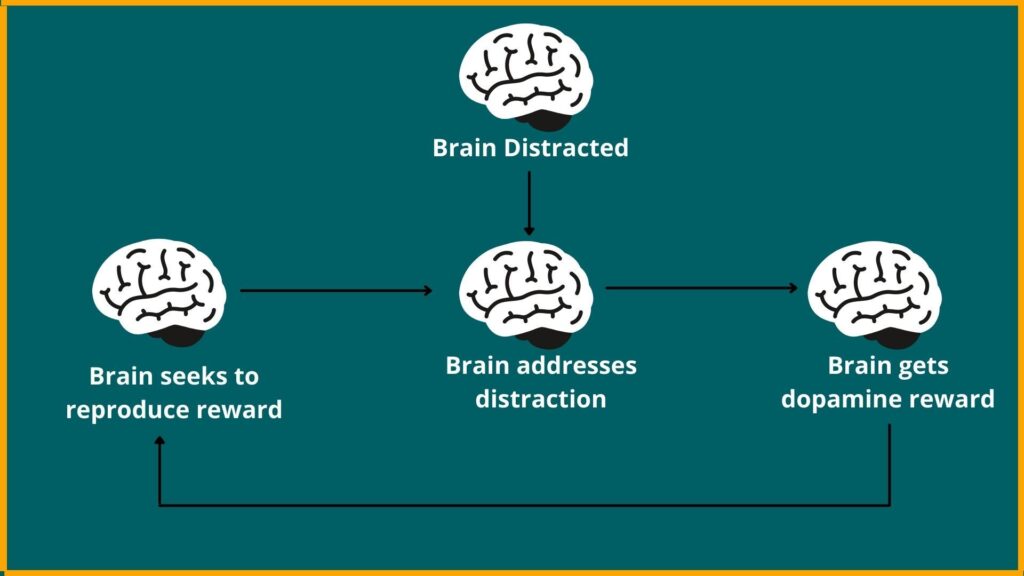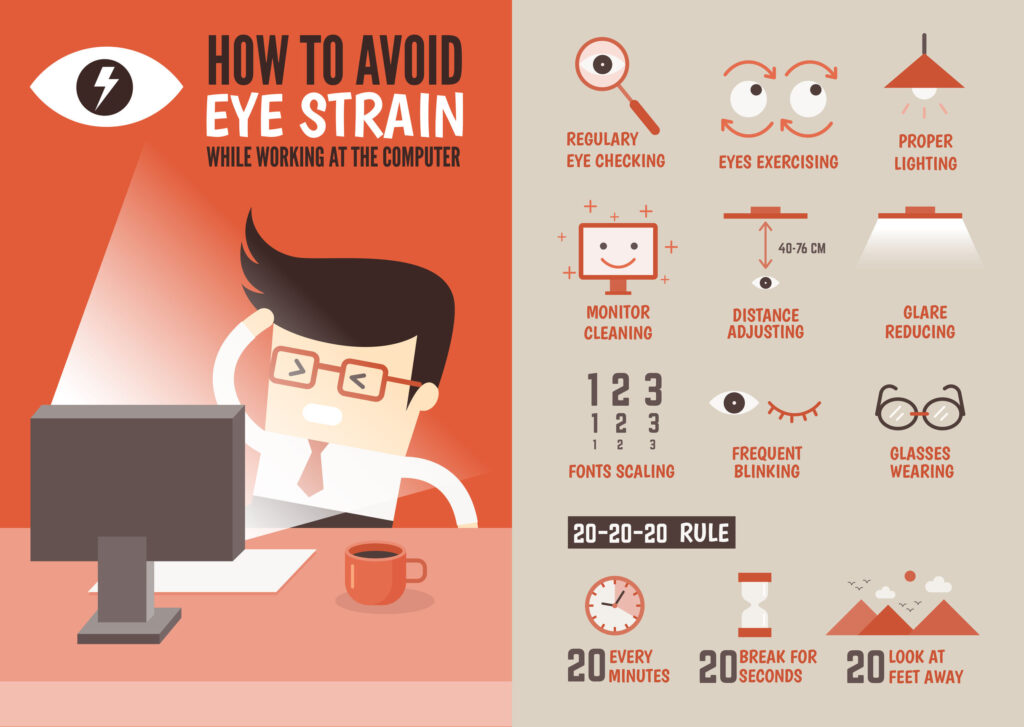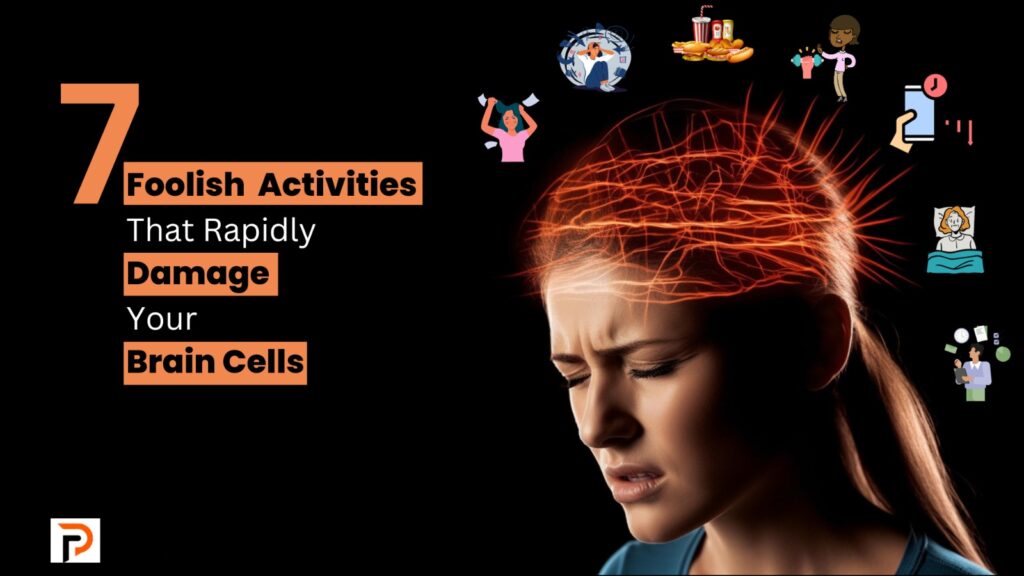Our brain, the intricate organ that governs our thoughts, emotions, and actions, is a remarkable piece of machinery that deserves our utmost care and attention. Unfortunately, certain daily habits can rapidly damage our brain cells and hinder their optimal function. In this blog post, we’ll explore seven foolish habits that can have a detrimental impact on our brain health and provide insights into how to protect this vital organ.
Table of contents
Mindless Multitasking: An Enemy of Focus and Productivity
In today’s fast-paced world, multitasking has become a badge of honor, a symbol of our ability to juggle multiple tasks simultaneously. However, this seemingly efficient approach often comes at a steep cost, as mindless multitasking can significantly impair our focus, productivity, and overall brain health.
The human brain is not designed to handle multiple demanding tasks concurrently. When we attempt to do so, our attention becomes fragmented, and our ability to process information effectively diminishes. This leads to errors, increased task completion time, and a general sense of overwhelm.
Studies have shown that multitasking can reduce productivity by up to 40%. This is because our brains are constantly switching between tasks, trying to keep up with the demands of each one. This constant switching creates a cognitive lag, making it difficult to fully focus on any one task at hand.

Multitasking also takes a toll on our mental well-being. The constant distractions and mental strain can lead to increased stress, anxiety, and even burnout. Additionally, the inability to fully engage in any one activity can leave us feeling unfulfilled and lacking a sense of accomplishment.
Combat the Negative Effects
To combat the negative effects of mindless multitasking, it is essential to adopt a more focused and intentional approach to our work and daily lives. Here are a few tips:
- Prioritize tasks: Identify the most important tasks that require your full attention and tackle them one at a time. Avoid the temptation to jump between multiple tasks, as this will only hinder your progress.
- Eliminate distractions: Minimize distractions by silencing notifications, putting your phone away, and working in a quiet, clutter-free environment.
- Set realistic goals: Break down large projects into smaller, more manageable tasks. This will make the work less daunting and help you stay focused.
- Take breaks: Allow yourself regular breaks to rest your mind and recharge. This will help you maintain focus and avoid burnout.
By adopting these strategies, we can reclaim our focus, enhance our productivity, and safeguard our mental well-being. Remember, multitasking may seem efficient, but it is ultimately a recipe for distraction, decreased productivity, and impaired brain health. Embrace a more mindful approach to your tasks, and you’ll be surprised at what you can accomplish.
Excessive Screen Time

In today’s hyperconnected world, screens have become an integral part of our lives. While they offer a wealth of information and entertainment, excessive screen time can have detrimental effects on our physical and mental health. The constant glare from electronic devices can strain our eyes, disrupt sleep patterns, and contribute to digital eye strain.
Moreover, the blue light emitted from screens can suppress melatonin production, a hormone essential for regulating our sleep-wake cycle. This can lead to insomnia, daytime fatigue, and mood disturbances. Additionally, excessive screen time can promote a sedentary lifestyle, increasing the risk of obesity, heart disease, and other chronic health conditions. It can also contribute to social isolation, as we become more engrossed in the virtual world and less connected to the real one.
To mitigate the negative effects of excessive screen time, it is crucial to adopt healthy digital habits. Set limits on screen time, especially before bed. Engage in regular physical activity and spend time outdoors. Prioritize face-to-face interactions with loved ones. And when using screens, be mindful of your posture and take regular breaks to reduce eye strain. By making conscious choices about our screen usage, we can strike a balance between the digital and physical realms and promote our overall well-being.
Skipping Quality Sleep
Sleep, the cornerstone of our physical and mental well-being, is often overlooked in the hustle and bustle of modern life. However, skipping quality sleep is a recipe for disaster, as it can have dire consequences for our brain health, cognitive function, and overall health.
When we sleep, our brains engage in a complex process of memory consolidation, repairing damaged tissues, and removing toxins. Without adequate sleep, these essential processes are disrupted, leading to memory impairment, decreased focus, and impaired decision-making.
Sleep deprivation also disrupts the production of brain-derived neurotrophic factor (BDNF), a protein crucial for neuron growth and survival. This can lead to a decline in cognitive function and an increased risk of neurodegenerative diseases like Alzheimer’s and Parkinson’s.

Moreover, sleep deprivation weakens our immune system, making us more susceptible to infections and illnesses. It also increases the risk of obesity, heart disease, and stroke. Chronically skipping quality sleep can have a profound impact on our physical and mental health, leading to a cascade of negative consequences.
To prioritize sleep, establish a consistent sleep schedule and aim for 7-8 hours of quality sleep each night. Create a relaxing bedtime routine, including avoiding screen time before bed. Ensure your bedroom is dark, quiet, and cool to promote sleep. By prioritizing sleep, you’re investing in your overall well-being and safeguarding your brain health for years to come
Ignoring Physical Exercise
Regular physical exercise is not just about building muscles and burning calories; it’s also a crucial factor in maintaining optimal brain health. When we ignore physical exercise, we deprive our brains of the essential nutrients and oxygen they need to thrive, leading to a decline in cognitive function and an increased risk of neurodegenerative diseases.
Exercise boosts blood flow to the brain, delivering essential nutrients and oxygen that support the growth of new neurons and the formation of new neural connections. This enhances cognitive function, including memory, learning, and problem-solving abilities. Exercise also promotes the production of brain-derived neurotrophic factor (BDNF), a protein that plays a critical role in neuron growth and survival.
Regular physical activity has also been shown to protect against neurodegenerative diseases like Alzheimer’s and Parkinson’s. Exercise reduces inflammation, a key factor in the development of these diseases, and promotes the production of neuroprotective substances that safeguard brain cells.
Ignoring physical exercise is a silent saboteur of brain health. By incorporating regular physical activity into our lives, we can nurture our brains, enhance cognitive function, and protect against the ravages of neurodegenerative diseases.
Poor Nutrition Choices
A balanced diet rich in fruits, vegetables, and whole grains provides your brain with the nutrients it needs to thrive. Avoid excessive consumption of processed foods, sugary drinks, and unhealthy fats, which can contribute to brain cell damage.
| Nutrient | Impact on Brain Health |
| Fruits and Vegetables | Rich in antioxidants and vitamins that protect brain cells from damage |
| Whole Grains | Provide sustained energy for brain function and improve cognitive performance |
| Lean Protein | Essential for building and repairing brain tissues |
| Healthy Fats | Support brain cell growth and communication |
| Limited Sugary Drinks | Excessive sugar intake can impair memory and learning |
| Limited Processed Foods | Processed foods often contain high levels of unhealthy fats, sodium, and sugar, which can contribute to cognitive decline |
| Balanced Diet | A balanced diet provides the nutrients your brain needs to function optimally and protect against neurodegenerative diseases |
Chronic Stress

Chronic stress, the prolonged exposure to stressful situations, is a pervasive issue in today’s fast-paced world. While occasional stress can be a motivator, chronic stress has a detrimental impact on our physical and mental health, particularly our brain health.
When we experience chronic stress, our bodies release excessive amounts of the stress hormone cortisol. This prolonged exposure to cortisol can damage the hippocampus, a brain region crucial for memory and learning. It can also lead to the shrinking of brain cells and the disruption of neural connections, impairing cognitive function and increasing the risk of neurodegenerative diseases like Alzheimer’s and Parkinson’s.
Moreover, chronic stress can contribute to anxiety, depression, and insomnia, further exacerbating its negative effects on brain health. The constant state of alertness and hypervigilance associated with chronic stress can also lead to burnout and impaired decision-making.
Managing chronic stress is essential for safeguarding our brain health. Effective stress management techniques include mindfulness practices like meditation and yoga, regular physical activity, and engaging in enjoyable activities. Prioritizing sleep and maintaining a healthy diet can also help mitigate the effects of stress. By addressing chronic stress, we can protect our brain health, enhance cognitive function, and promote overall well-being.
Lack of Mental Stimulation

Just as our bodies need regular physical exercise to stay healthy, our minds require mental stimulation to maintain optimal cognitive function. When we deprive our brains of engaging activities, we risk diminishing their sharpness and resilience.
This lack of mental stimulation can manifest in various ways, including:
- Declining memory: Our brains rely on frequent use and practice to retain information. When we fail to engage our minds, memory pathways become less active, leading to difficulties in recalling information and forming new memories.
- Reduced problem-solving abilities: Mental stimulation challenges our brains to think critically, analyze situations, and develop creative solutions. Without this stimulation, our problem-solving skills may become less agile, making it harder to tackle complex tasks.
- Diminished creativity: Creativity flourishes when our minds are exposed to new ideas, concepts, and experiences. Without mental stimulation, our creative spark may dwindle, making it challenging to generate new ideas and approaches.
- Increased susceptibility to cognitive decline: Studies have shown that a lack of mental stimulation can increase the risk of developing neurodegenerative diseases like Alzheimer’s and Parkinson’s. Engaging our minds helps maintain brain plasticity, the ability to adapt and form new connections, which is crucial for protecting against cognitive decline.
To combat the negative effects of a lack of mental stimulation, we can incorporate a variety of mentally engaging activities into our daily lives:
- Reading: Immersing ourselves in books exposes our minds to new vocabulary, concepts, and perspectives, stimulating cognitive growth.
- Learning new skills: Taking up a new language, instrument, or hobby challenges our brains to learn new patterns and information, enhancing cognitive flexibility.
- Puzzles and games: Engaging in puzzles, crosswords, or strategy games stimulates problem-solving skills, critical thinking, and memory retention.
- Creative pursuits: Engaging in activities like writing, painting, or playing music sparks creativity, imagination, and emotional expression.
- Social interaction: Engaging in meaningful conversations, debates, and discussions with others stimulates cognitive engagement and social-emotional intelligence.
By incorporating these mentally stimulating activities into our daily lives, we can nurture our cognitive abilities, protect against cognitive decline, and experience the joy of an active, engaged mind.
Conclusion
Your brain is a precious asset that deserves the best possible care. By avoiding the damaging habits discussed in this blog post and embracing brain-healthy practices, you can safeguard your cognitive abilities, enhance your mental well-being, and pave the way for a healthier and more fulfilling life. Prioritize your brain health today and reap the rewards for years to come.
Readmore:
Is Entrepreneur Born or Made?
What is the Most Common Trait Successful Startups Share?
How could a Travel and Tourism Company Utilize Virtual Reality to Enhance their Business?
What is EDP in Entrepreneurship?


